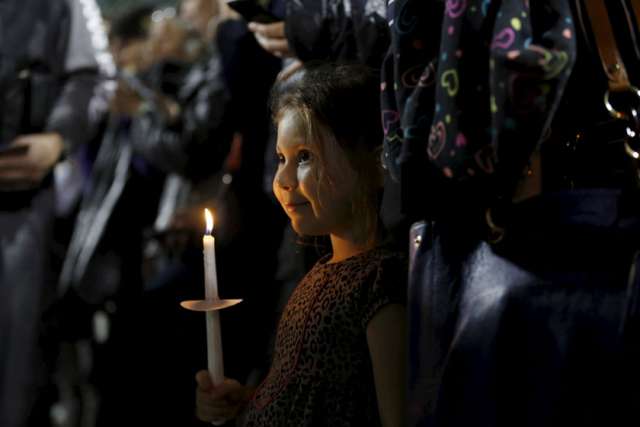In the aftermath of the recent San Bernardino killings, old and new media alike were awash with angry denunciations of those who offered public prayers for the 14 dead and 21 wounded. A New York tabloid published a front-page shriek commanding lawmakers to stop praying and start passing gun-control legislation. The Huffington Post demanded an end to “useless prayers” while the Daily Kos asked snidely how posthumous prayer helped the dead.
Internet memes echoed the theme. Among the juvenilia on Facebook was a crude drawing of a young woman holding up a sign saying, “Why didn’t God stop the killing?” and a young man with the counter sign: “Because He doesn’t (expletive) exist.”
The commentary differed from the usual neurotic handwringing over separation of church and state. It did not seek to merely limit the public places prayer can occur. It attacked the act of prayer itself.
Writing in the Wall Street Journal, columnist Peggy Noonan first took issue with churlishness of the commentary, and then mounted a stout defence of prayer as constitutionally protected free speech. She compared the phenomenon of “prayer shaming” to the closing down of debate on university campuses across North America.
But Noonan’s most compelling point was to question whether those so offended by prayer in the midst of right-to-bear-arms carnage are themselves ignorant of what prayer is and does.
“Maybe no one ever told them,” she wrote. “But prayer is a very active endeavour — it takes time, energy, concentration. You have to stop everything and ask God to hear you. It is hard to pray, much harder than it is to punch out a series of tweets.”
Here, it seems, is the heart of the matter: that the generation-long upsurge in random shootings is one symptom of a foundational spiritual sickness manifest not only in forgetting to pray, or even forgetting how to pray, but in forgetting what prayer actually is.
Of course, at a more surface level, these mass killing represent abject failure of the basic political will to insist that no civilian population needs an unfettered supply of high-powered ammunition in its homes. As has been pointed out, with four per cent of the world’s population, the United States has more than 40 per cent of the world’s privately owned guns. It is a monstrously absurd and reckless ratio.
A culture that has forgotten the essential nature of prayer, even if it is a culture that still moves its lips in occasional prayer, is a culture that has lost an authentic understanding of the sacred, of its own relationship to the truth of God. Prayer, after all, is the primary act of faith. It requires an act of will, as Noonan put it, to stop and ask God to hear. It requires an act of faith to live the understanding that there is a God to hear us. Prayer both initiates and clarifies that understanding.
As a culture, North America, perhaps the West generally, has confused prayer with an analogue of ordering through Amazon. We hit the send key for our wants to be fulfilled, and trust that some cosmic FedEx system will supply the goods in a reasonable delivery time. Underlying the criticism of prayer following the San Bernardino shootings, then, is indignation that God didn’t ship the properly sized bulletproof vests on time.
Of course prayer is nothing of that. Prayer is not filling out goods-and-services wish lists. It is the fulfilment of our true humanity in the moment of encountering God. And God, as the theologian Luigi Giussani puts it, “does not intervene from outside like a suffocating clause, like a prison to be caged in, but emerges from within, the deep companionship without whom we can do nothing. It is necessary to bring Him inside the things of which life is made because otherwise life would not be life.”
Which makes the recent attacks a drive-by on the very life we seek to protect. Strange, and stranger still.
(Stockland is publisher of Convivium magazine and a senior fellow with Cardus.)


